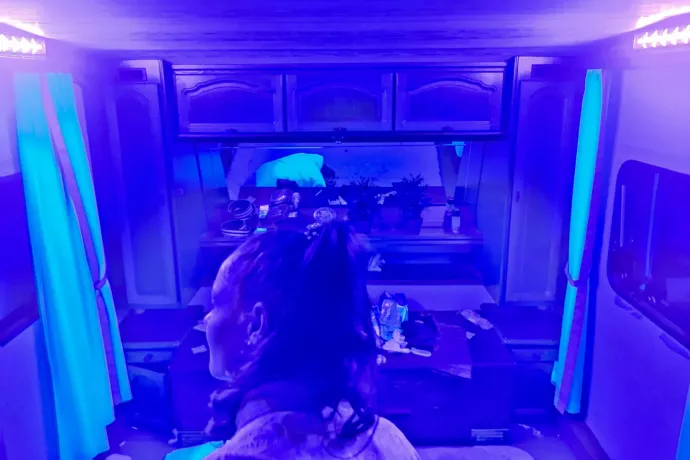
For almost two weeks, a black Dutch caravan travelled through Hungary. In it, Dutch police officers had set up an escape room to give a playful and at the same time oppressive demonstration of what prostitutes abroad are going through, behind whom all doors are closed, both symbolically and in reality. We took a look at the van in Nyíregyháza, tried it out, and in the process had a chat with the organisers and some visitors.
"It was very bad.”
"It was interesting and I was scared.”
"I wouldn't like to experience what she did, I was choked with tears.”
"Those ten minutes were enough to experience what this girl is experiencing.”
These quotes are from different teenage girls. We spoke to them on a beautiful autumn day, immediately after they had spent ten minutes trying to escape from the Dutch police's special escape room, a caravan called Escape Van. The caravan was parked in the centre of Nyíregyháza and made the 1,400-kilometre journey from Amsterdam to various cities in Hungary to raise awareness of human trafficking, especially among potential victims, as a preventive measure.
They could have brought textbook-like and/or shocking photos to scare girls with, but the escape room was clearly a cooler choice. It has the advantage of being relatable and exciting; in this case, a little scary, a little uncomfortable, a little dark, a little smelly and very symbolic.
The bus stopped in eight Hungarian cities for a day each, anyone could try it out, but during the preliminary organisation, the partners of the Dutch police in Hungary had already approached „more vulnerable groups” with the idea and assigned them to the escape room.
Why them and why Hungary? It has been known for years that in the red-light district of Amsterdam there is a street called ‘Nyíregyháza Street’ because most of the prostitutes working there come from the eastern part of Hungary (a play was recently produced about this phenomenon, as well as a feature film).
Recognising this, the Dutch police decided that it was a good idea to strengthen their cooperation with their partners in the country of origin, in the hope that in time they could also have an impact on reducing the number of people – mainly women – coming to the Netherlands for exploitation.
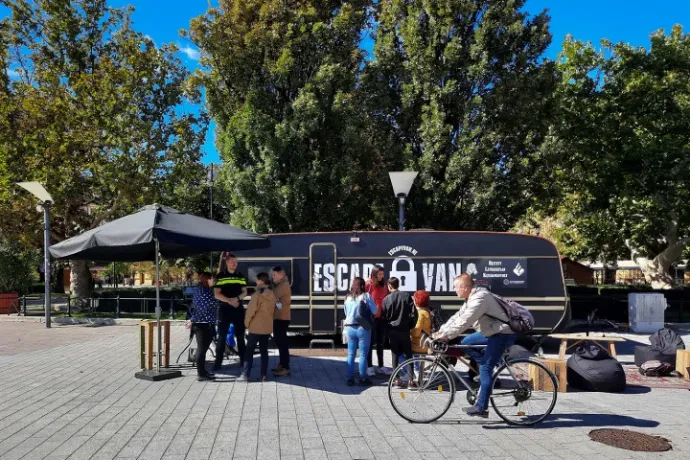
108 – that's the number recorded by the Dutch police and border guards in their official papers, the number of Hungarian victims of human trafficking from 2019 until mid-summer this year. However, they say this is only the tip of the iceberg: the real number could be five times higher, covering around 500-600 people, mostly women, mainly working as prostitutes.
In the Netherlands, prostitution can be described as regulated rather than legalised without restrictions. Under Dutch law, you can only work as a prostitute if you meet certain conditions: a minimum age, a legal certificate, and an assurance that the work is free from exploitation.
A complex experience in a very dense 10 minutes
It's almost impossible to escape from the escape room of the Dutch police, which was set up in cooperation with university research groups such as the University of Pécs, so the experience of success is missing. But the experience is not. I went in with one of the groups, to observe rather than participate.
The visitor is treated to a complex, multi-channel experience in a very dense 10 minutes: seeing, hearing, touching and smelling things, all in a dim, narrow space. After the darkness of the first few seconds, neon lights, an unpleasant, stale smell, scattered clothes, and empty condom bags are revealed to the caravan's guests; it's a place where you think twice about sitting down.
Around the seventh minute, I realise that we are definitely not going to get out of here, and from the eighth minute onwards the girls' desire to find a way out begins to wane. At the end of the tenth minute, the countdown clock reaches zero, the caravan door opens, and we step out onto the peaceful and sunny Nyíregyháza square.
"We deliberately designed the van to be a bit disgusting, which is why there is garbage inside, a mixture of the smell of a previously smoked cigarette and a cheap spray,” Jan-Willem de Vries, a Dutch police officer, later explained. – And it is also deliberate that it is very difficult to get out of here because that is what girls who get into this situation experience."
Nóra's story
It's definitely worth mentioning the tired voice pouring out of the speakers: a former prostitute named Nóra tells her story. A 17-year-old girl exits the caravan and recalls exactly what she heard, even though she did her fair share of searching for a way out:
"She was taken to the Netherlands because a boy seduced her, and then he told her he was in love with her and wanted to see her like that too, and she didn't object, she just jumped right in, and then one thing led to another, and he filmed her naked. She tried to resist and then she had quite a lot of grievances. Mental pain and so on, for which she started taking all sorts of medication. She also said she was of age and the police had taken her in.”
As we later learn from Jorn van Rij of the Dutch police, the mastermind behind the getaway caravan, Nóra's character is actually real, pieced together from the stories of three girls he interviewed over the years (one of whom, the one on whom Nóra's character is most closely based, still suffers from the effects of exploitation: in addition to severe mental and physical problems, she can never have children because of a serious rape).
"I put together three stories to fully show the risk of exploitation and abuse, how they work and their effects,”
explains Jorn van Rij.
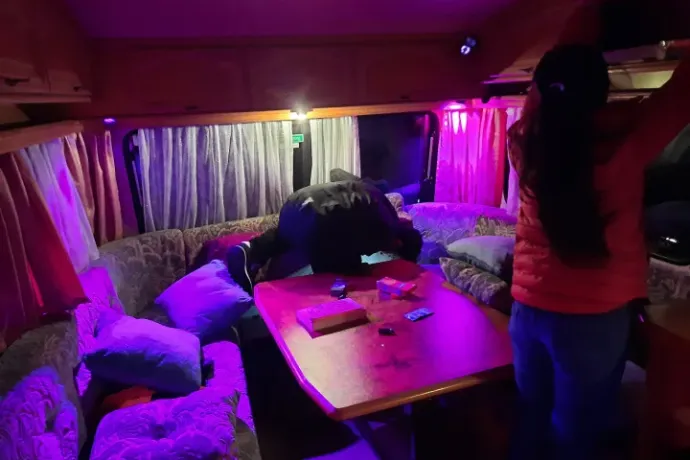
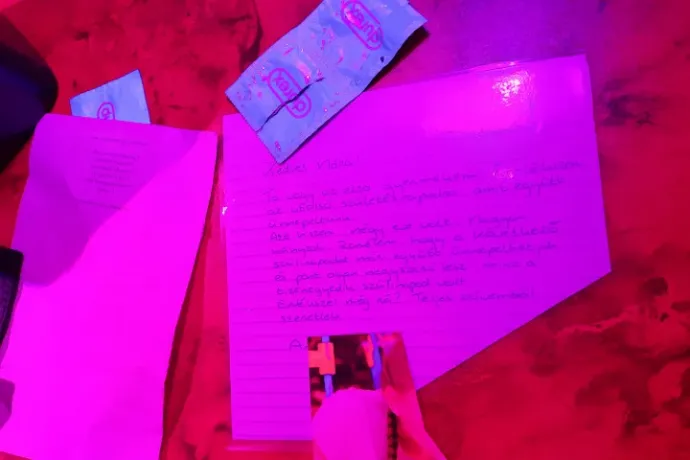
„Do you know anyone who has had similar things happen to them as Nóra?” – I ask the girls as they exit the caravan, a little afraid that they might take offence at my question. No such thing, five of the seven young girls' hands immediately go up in the air. „The one I knew got out of it after about ten years,” says one of them. Another girl shares that a former classmate goes back abroad with a boyfriend to this day and „has some money from that”.
A small group of my conversation partners came from a child protection institution in Nyírség, the eastern part of Hungary, brought by the child development teacher who works there, she says, "as a preventive measure”. „Unfortunately, it happens that young people who are affected by child protection are exploited when they come of age,” she says.
Multitasking didn't work as well for everyone as it did for the 17-year-old girl I just quoted; some were so immersed in the mysteries of the escape room that only sound fragments reached them, and when they left the caravan they couldn't recall what they had heard inside.
The organisers also took note of this: while in their experience, in such a situation the Dutch would first sit down and listen to the story – as it might contain useful clues – and only then start looking, the Hungarians immediately got to work. Jorn van Rij and his team hadn't counted on this, but they're incorporating the knowledge into their next project. All in all, he was satisfied with his tour of Hungary:
„If we were able to reach just one person, or prevent one of our visitors from becoming a victim, then I think we have achieved our goal.”
He was pleased that they were able to attract the interest of local police forces and foundations. In addition, they have received feedback from several visitors that it was interesting to search for a way out while learning about forced prostitution by listening to Nóra's story. Some of them were as shocked as the girls who spoke at the beginning of the article, „but there was also someone who was not interested in the story and said she could hang out here for a while”, said Anna Sallai, a Hungarian member of the Dutch police.
In one town they were being watched all day, and then it became mutual
According to Dutch police records, an average of 40 visitors a day tried to escape from the caravan. The organisers also tried to lure passers-by from the street, who, even if they did not want to try the escape room, occasionally spoke with the police.
A strange situation developed in a town in Transdanubia: a man and his team were watching them all day – which they obviously spotted pretty quickly, as they are police officers. They invited the men into their caravan, but they refused. In another town, a man who was completely uninterested in the escape room turned up, but was keen to learn more about police cooperation between the two countries and the details of the fight against human trafficking. And because he knew the Dutch laws on prostitution by heart,
"we began to suspect that he was working for the other side".
As they interacted with their Hungarian colleagues in every location, they shared such unusual experiences with them as well.
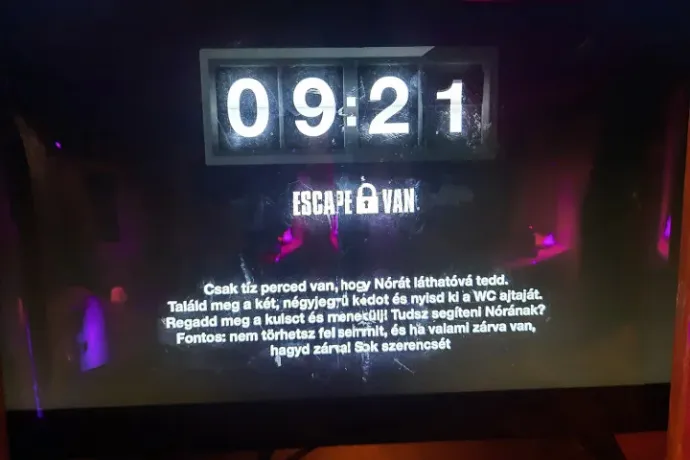
According to some, Hungarian traffickers (commonly known as pimps) and their victims have since 2015 become less and less focused on the Netherlands and have moved their headquarters to the Middle East. However, Jorn van Rij says that after the football World Cup in Qatar, they will slowly return to Hungary, but only until they begin looking for new routes to Western Europe again. “We want to know in good time when and how this will happen so that we can intervene quickly and effectively.”
The National Crisis Management and Information Helpline can be contacted for free, 24 hours a day, at 06-80-20-55-20 by victims of domestic violence, child abuse, prostitution and human trafficking in need of help. NANE Association also runs a helpline for abused women and children and for those who want to help them. It can be called anonymously, free of charge, at 06-80-505-101 between 6 and 10 p.m. on Monday, Tuesday, Thursday and Friday evenings and between 12 and 2 p.m. on Wednesdays. The Hungarian Ecumenical Relief Organisation offers anonymous counselling online, visit their page for details. If you have specific legal questions about domestic violence, you can call Patent Association's legal helpline at 06-70-220-2505 on Wednesdays between 4 and 6 pm and Thursdays between 10 am and 12 noon.
For more quick, accurate and impartial news from and about Hungary, subscribe to the Telex English newsletter!
The translation of this article was made possible by our cooperation with the Heinrich Böll Foundation.